Berkeleyan
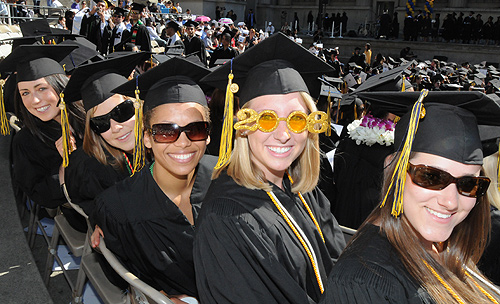 \ |
‘An inch of time should be highly prized’
(and other wisdom from the podium)
![]()
| 04 June 2008
Good graduation pictures, in capturing joy and a sense of accomplishment, resemble one another closely. Good graduation speeches, if carefully written and skillfully delivered, strike their own singular chords. Herewith examples of both, from the Berkeley commencement season just concluded.
Physics and Physical Sciences
Arthur Rosenfeld
Commissioner, California Energy Commission; professor emeritus of physics
Good evening graduates, parents, families, friends, and admirers. Who am I, and what am I doing here standing between you and your diplomas?
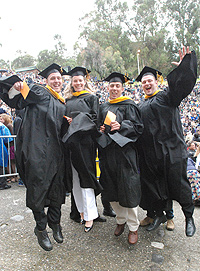 |
Philosophy
David Blinder
Associate vice chancellor, University Relations
This is surely a time of well-deserved celebration for the students here, all of whom had the wisdom to choose philosophy — in Greek, “love of wisdom” — as a major, and many of whom I suspect exercised a considerable amount of courage to make that choice.
Why courage? Because it’s one of those majors that trains you rigorously for everything in general and nothing in particular — except for the very few here who will receive an advanced degree to teach philosophy.
That often-heard question “What do you do with a degree in philosophy?” usually means, “How do you make a living with a degree like that?”
My father raised that question with me. He was a graduate of the Merchant Marine Academy, served in the Second World War, and became a successful businessman. He wanted me to go to medical school. His response to my choice of a philosophy major as a Princeton undergraduate was, “What will you do? Open a store?”
International and Area Studies
Adeel Iqbal
Graduating senior
Hard to believe, but we’re finally here. It didn’t quite hit me until two weeks ago that this was really it: More than four years of study at UC Berkeley have come to an end.
It began to settle with me the other night, when I got home from thesis writing after Moffitt Library closed at 2 a.m. As I was walking into my room, I took notice of something that I had become so used to passing by. My roommate and I have this odd habit of taping up on our bedroom door every fortune-cookie quote we get from Mandarin House on Durant and Shen-Hua on College. I stopped myself and began to read the messages over again. My eyes stopped at one in particular:
“A foot of jade is no value; an inch of time should be highly prized.”
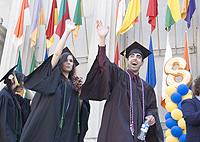 |
This time, these words seemed to have a special meaning. An inch of time should be highly prized. It struck me — my time at Cal is over.
So I began to think as many of us students tend to do in the wee hours of the night. What have I done over these past years? What has all this meant?
My circle of thoughts took me through blue books, more blue books, S+D curves, the smell of mocha at FSM, through squirrels (big fat ones chasing after each other in the spring), realizing exactly how many reader pages I had not read the night before a test, through Robert Price’s thick New York accent in Poli Sci 2 spouting out the socio-political benefits and consequences of the command economy, through making the most important decisions of the world in Eshleman Hall, to laying back with my homie for life and checking out Cal’s finest on Sproul.
I also thought of standing in the pouring rain, yelling at the top of my lungs as we watched Marshawn and the Bears destroy the Oregon football team at Homecoming two years ago. And about late night-slash-twilight chatter about values and ethics in the dorms. And about sleeping in class in Wheeler . . . and sleeping in North Gate . . .and sleeping in 155 Dwinelle. Just sleeping pretty much anywhere, really.
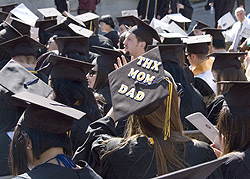 |
Gender and Women’s Studies
Jacqui Alexander
Professor of women’s studies and gender studies, University of Toronto
Your degree today will not list the achievements that I will list now. It will list your academic achievements, and those are important; this rite of passage is important. But absent from those degrees would be the political struggles you organized during the time that you’ve been here against wanton environmental devastation at the service of corporate expansion. You’ve organized against fee hikes, by which you mean that education is deemed to be affordable and accessible, not an added privilege to those who already have a disproportionate amount of privilege. You have called for a halt to the genocide in Darfur, to human trafficking, to the Israeli occupation of Palestine. You have been vocal on the question of workers’ rights here on the campus. The working class is not to bear the brunt of the underside of capitalism. It is reminiscent of a campaign of workers at Harvard University about a decade and a half ago, whose slogan was, “We can’t eat prestige.”
Energy and Resources Group
Ananya Roy
Associate professor of urban studies; associate dean, international and area studies
The 21st century has started on a quite stunning note: that of a mobilization of global conscience — the need to end poverty, the need to mitigate climate change. The lodestones of poverty and the environment mark the consolidation of a global collective committed to a better world. . . .
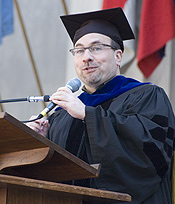 |
As I research, teach, write, and speak about this millennial moment, I am struck by the scale and spread of this mobilization of conscience, of the young men and women who have signed up to end poverty, to volunteer, to serve. And I am moved and inspired. But I also struggle with something: that it is a mobilization of conscience. The question I have been asking myself is how we may move from a place of conscience to politics, from good-faith efforts to the political. Here is the difference as I see it:
The mobilization of conscience rests on the idea of responsibility. But responsibility is only possible when one has the power to be responsible — the power to be a donor, for example. Who then bears that appellation? When is a loan framed as a gift, a command framed as a contract? Tied up with this global sense of responsibility is the practice of serving and volunteering. I like to use an older term, voluntarism, which precedes the more narrow term “volunteerism.” Voluntarism derives from the Latin voluntas and indicates “will” or “desire.” And so the figure of the volunteer is in fact empowered, she has will, she has desire. She is not just a willing subject; she is a willful subject.
How do we move from this place of conscience to the political, from ideas of responsibility to accountability, to a form of global citizenship where we are not simply responsible but also accountable, where we have to answer to, account for. Do we dare be accountable to the communities in which we volunteer? Do we dare to recognize that we may have had a role to play in producing the poverty and inequality that we seek to mitigate through our service? This more reflexive and critical form of global practice is what we can call praxis, a form of global citizenship organized around the idea of the political rather than that of conscience — and it is very difficult to forge.
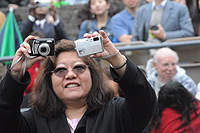 |
School of Law
Anne Joseph O’Connell
Assistant professor of law
Learning about the law, interacting with classmates, and taking examinations were key aspects of law school for many of you. Learning about the law, of course, took place inside and outside of the classroom. . . .Granted, some were underachievers — focusing only on the class at hand, transcribing every word. But many were discontent to confine themselves to this conventional, perhaps antiquated approach. You needed to learn more during class. So some used their laptops to turn simultaneously to news and politics (New York Times, Drudge Report). Some turned to gossip — law-related (Nuts and Boalts, Above the Law) and non-legal gossip (Perezhilton, What Would Tyler Durden Do?). And some reconsidered their decision not to go to veterinarian school (pandacams at the San Diego Zoo, Cuteoverload.com). And unlike the University of Chicago, we didn’t turn the wireless off.
Sociology
Dan Hai Nguyen
Graduating senior
Words like “preeminence, prestige, and promise” are associated with UC Berkeley because this institution attracts some of the best talent in the world. But is it enough to celebrate knowledge discovered or created? The amount of information available to mankind doubles each year. Yet this body of knowledge, if we use it to measure our progress, includes the technology that makes agriculture plentiful, but also the standards that permit harmful chemicals into our foods, and the plastics that wrap them into our oceans. It includes the lessons taught at diplomacy schools, but also the programming for our Trident missiles, and the definitions of terrorism excusing torture. It includes the public-service announcements of the Red Cross and Mothers Against Drunk Driving, but also the strategies cigarette companies use to target our children while we are alive, and the tactics life-insurance companies use to betray them in our absence.
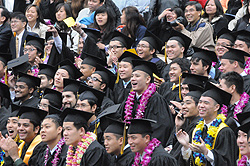 |
There would be cause for worry if we were known around the world first for our academic preeminence, and secondarily for the public work of our graduates, the latter of which was not calculated by U.S. News and World Report in ranking us. There would be cause for worry if the pursuit of individual achievement were to displace the pursuit of positive social change, the latter of which was not calculated in our grade-point averages. There would be cause for worry if the meritocratic ideal risked the forfeiture of humanistic ideals in guiding our daily actions, the latter of which were not prioritized in our admission criteria. Such measures tell us everything about why we are valued, except that which makes us valuable.
The drive for achievement and distinction that brought us here so often becomes habit, impulse, and norm. We cannot forsake sympathy and support, conscience and indignation, in the single-minded pursuit of our own goals and our own objectives.
International and Area Studies
Nezar AlSayyad
Chair, Middle Eastern studies
Of the many theorists that you have read, perhaps none was more illustrious than Edward Said, whose book Orientalism established the entire field of postcolonial theory. I remember standing on this very stage, in 2003, with the rather difficult task of introducing Edward Said before he was to speak to this hall packed with Berkeley students, faculty, staff, and members of the community. It was a few months before Said passed away; as it turned out his talk at Berkeley was his last major public speech.
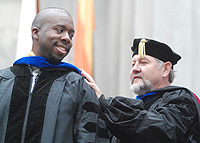 |
The tickets for the Said event, which were offered for free, had sold out in a matter of hours, and an overflow crowd was accommodated in other campus halls. That day, I went to Caffe Strada, as I always do in the morning, to get my coffee. There was the same homeless man who always stood outside, panhandling. As I came out with my coffee, he looked at me aggressively. And as I was fetching some change from my pocket, he yelled at me — “I don’t want money today. I want an Edward Said ticket.”
When I told Said about the incident, he was very flattered, but as I was going to share it with this large audience, I realized that this was as much a Berkeley story as it was an Edward Said story.
Theater, Dance, and Performance Studies
Philip Kan Gotanda
Playwright and filmmaker
Some may ask, “Does what I do matter?” In a time of world crisis, where cyclones and earthquakes kill thousands, where civil and religious wars destroy lives daily, can someone with a degree in Theater, Dance, and Performance Studies do something impactful?
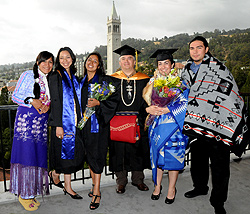 |
Yes. All the yelling, attacking, demanding, speechifying — and yet, no one hears. No one listens. Look around. See. No one is communicating on the most basic human level — my soul to your soul.
Art can do that. It speaks and communicates below the surface, between the gaps of rationality and empirical argument. It provides the bed of commonality for transmission of human experience without violence or censorship. It is the larger truth that must always be spoken regardless of political winds and individual sacrifice.
School of Information
Genevieve Bell
Director, Intel User Experience Group
I grew up in the field, in my mother’s field sites in Australia. She is an anthropologist too, and we joke in my family that anthropology is less a career and more a way of being in the world. Perhaps it is no surprise then that my earliest and most vivid memories are cultural in nature: the feel of a Balinese dance costume as I was bound into it and discovered I could no longer bend in the middle; the stories from elderly men and women who remembered what their part of Australia was like before European settlers arrived; the smoky smell of animal fat and ochre as Aboriginal women painted their country on my body; the moment when I realized that I was expected to be, as they would say at Ali-Curang, “boss for myself” — and I was only 8. Even as a child, this is what I knew anthropology to be — it changed you forever.
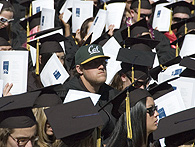 |
Today, it is still those moments when the unfamiliar pierces me that I treasure: the sweet taste of freshwater fish from the Coorong served at a Ngarrinderi wake; the call to salat rising above the ceaseless sounds of Jakarta’s traffic; the sight of hundreds of tiny decaying plastic Buddhas at a Pusan temple, each one representing someone’s personal prayer or hope. And what distinguishes these moments from a stream of photos on Flickr or at a retro slide night is the way it felt for me to be there, and how challenging it was to see the world through other people’s eyes.
Languages and Literatures
Andrew Garrett
Professor of linguistics
Though linguistics is not officially represented here today, we have longstanding and intellectually close relationships with Berkeley’s language and literature programs. . . . Proximity is the most obvious of our relationships. The Department of Linguistics and the language and literature programs represented here today share a labyrinthine academic building called Dwinelle Hall. I will now tell you how to get from the Computer Research Facility in Dwinelle, where parents might need to retrieve their children finishing projects, to my Linguistics office. I’ll be as explicit as possible to highlight the close relationships in question.
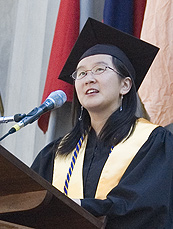 |
The Computer Research Facility is in room 310, which is on the third floor, building level F. Go out that room, head down the hall, and turn right onto the main corridor. At the end of the corridor you pass through a doorway, and you immediately find yourself on the seventh floor, which is level G. On your left is a stairway; go down four flights to the third floor, which is level C. If you make a mistake and go all the way down to level B, the second floor, then to get to Linguistics on the bottom floor you’ll have to go up an extra little staircase before you can get down to us. So be sure to exit the staircase on level C. Level C is the third floor, to repeat, but this is a different third floor from the one where you started, housing room 310, on level F, which is also the sixth floor in another part of the building. Anyway, having left the staircase at level C, turn to the right. On your right you pass room 3422, which is still on the third floor, and to your left is room 76, which is in the first basement, which is also on level C but two floors higher than Linguistics, which is above ground. So you take a right and you’ll confront some more stairs. You’re about two-thirds of the way there now. Actually, I don’t have time to get you all the way to my office now, but if you give me a call I can come get you. . . .
Art Practice
Elizabeth Demaray
Assistant professor, fine arts, Rutgers University
My dears, I can’t tell you what a pleasure it is to be here with you today. You who have worked so hard. You who have braved treacherous financial-aid forms, endured opinionated psychotic street people, survived the bathrooms in cooperative housing, eaten the food at the food court on Durant, completed Introduction to Probability and Statistics. Finagled the lighting in the Student Gallery and surrendered to the public couches in the lounge at the law school when you’re too tired to go home because you’ve been working endless, endless hours in studio honing your works of art until they speak to you in a voice that you’ve been wanting to hear. You, I am so proud of you!

